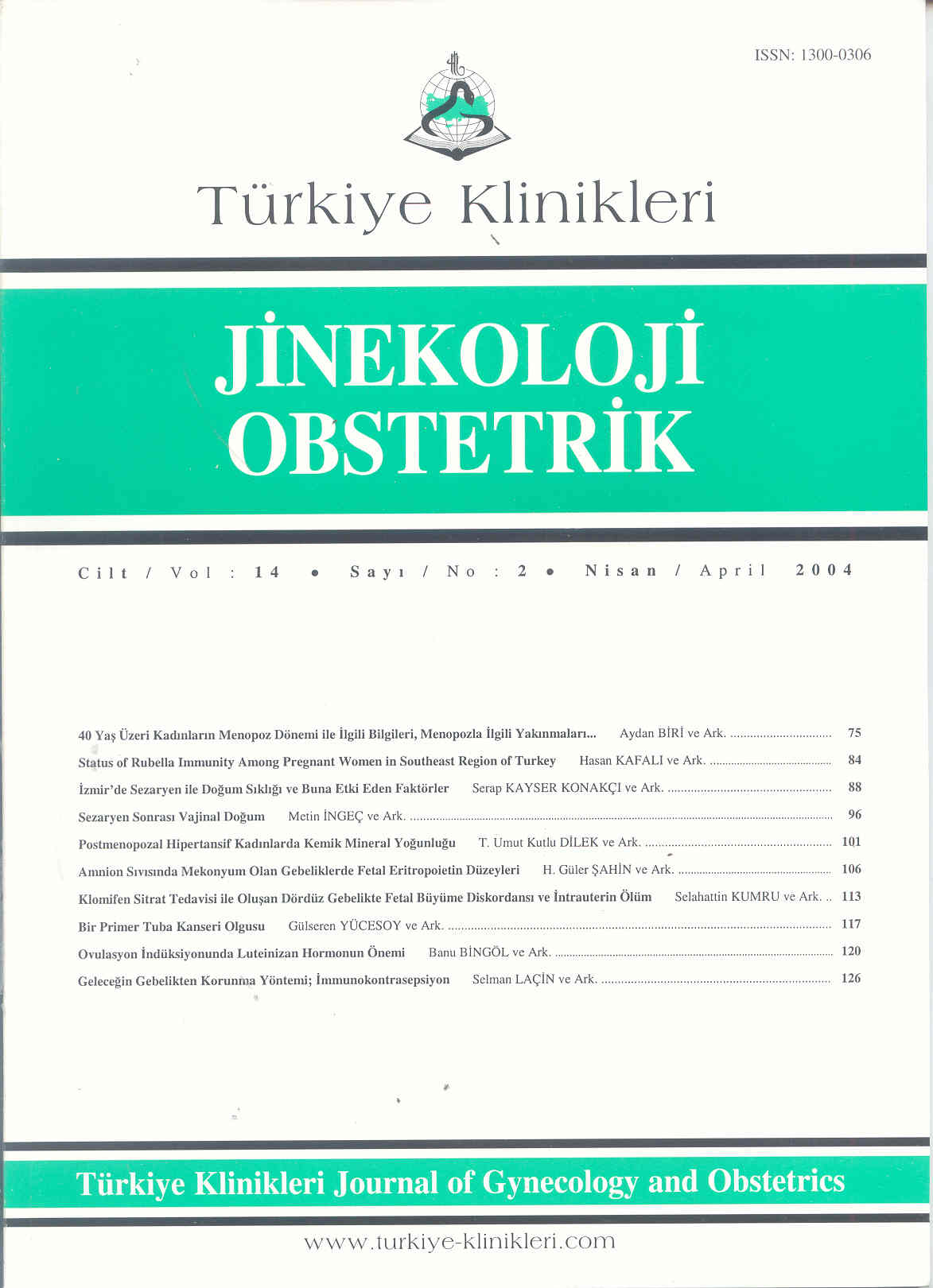Open Access
Peer Reviewed
REVIEW
3587 Viewed1214 Downloaded
Contraception Method Of Future : Immunocontraception
Geleceğin Gebelikten Korunma Yöntemi; İmmunokontrasepsiyon
Turkiye Klinikleri J Gynecol Obst. 2004;14(2):126-30
Article Language: TR
Copyright Ⓒ 2025 by Türkiye Klinikleri. This is an open access article under the CC BY-NC-ND license (http://creativecommons.org/licenses/by-nc-nd/4.0/)
ÖZET
Günümüzde daha yaygın, etkin ve daha güvenli kontraseptif yöntemlere acilen ihtiyaç olduğu aşikardır. Bu yazıda alternatif bir yöntem olan immunokontrasepsiyon, yani kişinin immun sisteminin gebelikten korunmaya yönelik olarak aktive edilmesi konusu bugün ve gelecek açısından irdelenmiştir. İmmunokontrasepsiyon konusunda özellikle son yıllardaki yerli ve yabancı literatür gözden geçirilmiştir. Her iki cinse ait gamet hücreleri olan sperm ve oositler potansiyel antijenik hedefler olarak düşünülmüş ve her iki hücre tipine yönelik pekçok araştırma yapılmıştır. Memeli oositlerinde bulunan özgün bir ekstrasellüler matriks proteini olan zona pellucidanın üç majör glikoproteini (ZP-1, ZP-2, ZP-3) üzerindeki çalışmalar halen sürmektedir. Aynı şekilde, monoklonal antikor teknolojisinin gelişmesi ile sperm üzerinde bulunan birçok antijen aynı amaca hizmet edebilme olasılıkları açısından tanımlanmıştır (FH-1, PH 20, PH 30, SP10 vb. gibi). Son yıllarda sperm-oosit interaksiyonunda önemli rolü olduğu gösterilen integrinler, nitrik oksit, kadherinler gibi birçok adezyon molekülü üzerindeki çalışmalar dikkat çekicidir. Hormonlardan ise FSH ve özellikle anti-hCG antikorları bugüne kadar insan çalışması yapılmış olan tek immunokontraseptiftir. Tüm gelişmeler gözden geçirildiğinde libidoyu ve hormon üretimini bozmayan, efektif ve yan etkilerden arındırılmış kontraseptif bir aşının önümüzdeki on yıl içersinde kullanıma girmesi pek muhtemeldir. Genetik bilimindeki ilerlemeler birçok alanda olduğu gibi kontraseptif aşılarda da ilerlemenin temellerini oluşturmaktadır.
Günümüzde daha yaygın, etkin ve daha güvenli kontraseptif yöntemlere acilen ihtiyaç olduğu aşikardır. Bu yazıda alternatif bir yöntem olan immunokontrasepsiyon, yani kişinin immun sisteminin gebelikten korunmaya yönelik olarak aktive edilmesi konusu bugün ve gelecek açısından irdelenmiştir. İmmunokontrasepsiyon konusunda özellikle son yıllardaki yerli ve yabancı literatür gözden geçirilmiştir. Her iki cinse ait gamet hücreleri olan sperm ve oositler potansiyel antijenik hedefler olarak düşünülmüş ve her iki hücre tipine yönelik pekçok araştırma yapılmıştır. Memeli oositlerinde bulunan özgün bir ekstrasellüler matriks proteini olan zona pellucidanın üç majör glikoproteini (ZP-1, ZP-2, ZP-3) üzerindeki çalışmalar halen sürmektedir. Aynı şekilde, monoklonal antikor teknolojisinin gelişmesi ile sperm üzerinde bulunan birçok antijen aynı amaca hizmet edebilme olasılıkları açısından tanımlanmıştır (FH-1, PH 20, PH 30, SP10 vb. gibi). Son yıllarda sperm-oosit interaksiyonunda önemli rolü olduğu gösterilen integrinler, nitrik oksit, kadherinler gibi birçok adezyon molekülü üzerindeki çalışmalar dikkat çekicidir. Hormonlardan ise FSH ve özellikle anti-hCG antikorları bugüne kadar insan çalışması yapılmış olan tek immunokontraseptiftir. Tüm gelişmeler gözden geçirildiğinde libidoyu ve hormon üretimini bozmayan, efektif ve yan etkilerden arındırılmış kontraseptif bir aşının önümüzdeki on yıl içersinde kullanıma girmesi pek muhtemeldir. Genetik bilimindeki ilerlemeler birçok alanda olduğu gibi kontraseptif aşılarda da ilerlemenin temellerini oluşturmaktadır.
ANAHTAR KELİMELER: İmmunokontrasepsiyon, sperm antijenleri, oosit antijenleri
ABSTRACT
It is obvious that more wide spread, more effective and more reliable contraceptive methods are needed. This paper is about the present and future aspects of an alternative contraceptive method, immunocontraception, where a persons immune system is activated to act in a contraceptive manner. Local and international literature about immunocontraception has been detected. Sperm and oocyte, gamete cells of both sexes, have been considered as potential antigenic targets and many studies have been done about both cells. Studies about three major glycoproteins (ZP-1,ZP-2,ZP-3) of the zona pellucida, an extracellular matrix protein found in mammalian oocytes still continue despite ovarian follicle damage and premature ovarian failure. Similarly many antigens on the sperm cell have been identified (FH-1,PH20, PH30, SP10 etc.) with the development of monoclonal antibody technology. Interesting are studies about integrins, nitric oxide, cadherins and other adhesion molecules that take a role in sperm-oocyte interaction. FSH and especially anti-hCG antibodies are the only hormonal immunocontraceptives studied on humans. In the light of all studies and developments it is possible that a contraceptive vaccine that does not interfere with libido and hormone production, is effective and has no side effects will be on the market in the coming ten years. Development of genetics is the base of many fields as well as of contraceptive vaccines.
It is obvious that more wide spread, more effective and more reliable contraceptive methods are needed. This paper is about the present and future aspects of an alternative contraceptive method, immunocontraception, where a persons immune system is activated to act in a contraceptive manner. Local and international literature about immunocontraception has been detected. Sperm and oocyte, gamete cells of both sexes, have been considered as potential antigenic targets and many studies have been done about both cells. Studies about three major glycoproteins (ZP-1,ZP-2,ZP-3) of the zona pellucida, an extracellular matrix protein found in mammalian oocytes still continue despite ovarian follicle damage and premature ovarian failure. Similarly many antigens on the sperm cell have been identified (FH-1,PH20, PH30, SP10 etc.) with the development of monoclonal antibody technology. Interesting are studies about integrins, nitric oxide, cadherins and other adhesion molecules that take a role in sperm-oocyte interaction. FSH and especially anti-hCG antibodies are the only hormonal immunocontraceptives studied on humans. In the light of all studies and developments it is possible that a contraceptive vaccine that does not interfere with libido and hormone production, is effective and has no side effects will be on the market in the coming ten years. Development of genetics is the base of many fields as well as of contraceptive vaccines.
MENU
POPULAR ARTICLES
MOST DOWNLOADED ARTICLES





This journal is licensed under a Creative Commons Attribution-NonCommercial-NoDerivatives 4.0 International License.










